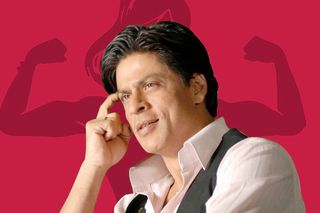
The Problem With SRK’s Feminist Davos Speech
Last week, actor Shah Rukh Khan was awarded the World Economic Forum’s Crystal Award, which recognizes “the achievements of outstanding artists who have shown exemplary commitment to improving the state of the worl...

Last week, actor Shah Rukh Khan was awarded the World Economic Forum’s Crystal Award, which recognizes “the achievements of outstanding artists who have shown exemplary commitment to improving the state of the world.” The award celebrated Mr. Khan’s Meer Foundation, which laudably works to empower burn and acid-attack survivors, most of whom are women. Unfortunately, Mr. Khan’s remarks at the reception displayed a paternalistic mindset that is anything but empowering.
We’re all Shah Rukh Khan fans here, onscreen and off. The Meer Foundation does good work, and we’re glad its efforts and Mr. Khan’s backing are in the spotlight. We were also glad to see Mr. Khan’s grace in recognizing the real heroes — the women who don’t let the pain and disfigurement of violently misogynistic acid attacks stop them. Per The Hollywood Reporter:
“It’s the first time in my whole career where I’ve gotten an award for someone else’s work, someone else’s bravery,” Khan said of the honor.
But after that, things got a little weird:
Khan also acknowledged the female movie stars he has worked with throughout his career. “[Women] work harder than I do. They come in four to five hours before I even land on the set. They are somehow considered secondary in the scheme of things of this film world. It’s a man’s world,” he said.
Allow me to explain why these statements are (unintentionally) paternalistic.
No woman is sitting around thinking it’s okay for a man to take recognition for her hard, exceptional work. She accepts it because she has no choice. Accepting a dynamic you’ve been conditioned to feel you can’t change isn’t strength. And accepting someone else getting equal credit for less or worse work isn’t something to aspire to, or glorify. Calling this kind of acceptance strength is a Gordian logic so twisted it actually feeds, full circle, into what Mr. Khan was probably trying to disrupt: a pervasive, paternalistic sexism that denies women the recognition they deserve.
And yet, it speaks to the privilege of the male experience (or, in Mr. Khan’s case, the extremely privileged male experience) that there’s any logic to it at all: If silent acceptance is strength, as Mr. Khan seems to suggest, then by default, outspokenness is victimhood; any attempt to discuss the stacked deck is therefore a form of self-pity or complaint.
This is a dangerous vision of female strength to peddle, and it’s hardly feminist. Mr. Khan has recognized the deep unfairness of women’s experiences, but by casting the vehicle of change — outspokenness — as an act of victimhood, he risks stifling challenges to the status quo.
Incidentally, challenging the status quo is where real strength lies. It lies in pointing out sexist slights, like your male coworker getting recognition for your work, or having to work twice as hard for any credit at all; it lies in fighting again and again for a salary commensurate to your male peers’; it lies in calling for societal change; it lies in taking on misogyny so deeply ingrained an entire industry willfully ignores predation because it values abusers’ art over women’s dignity and lives.
(But that’s probably on us. We haven’t worked hard enough to explain how these efforts take strength. Guess we’ll have to redouble them if we expect to have any effect.)
At home, frankly, Mr. Khan’s statements wouldn’t stand out much among domestic discourse. On the world stage, amid a week during which heads of state, businessmen and philanthropists laid out visions for the future, and following months of #MeToo and #TimesUp movements within Mr. Khan’s own, global industry, it sounds disappointingly retrograde. A “Let them eat cake!” moment from the pages of a history book.
Mr. Khan’s strength, perhaps, is in gestures, not words. His actions suggest his feminist intentions are pure: ceding top-billing to his female co-stars and paying (according to him) equal compensation to men and women in his productions. These efforts are strong and laudable, and deserve recognition. We wonder how accepting Mr. Khan would be if he hadn’t received it. Probably not very. From his same speech:
“Here I am worrying about a film that has not collected money. I’ve found so many faults with my life in the last 10 years. I don’t have a private plane. The whole world is against me and I’ve become such a victim.”
We see your strength, Mr. Khan, in your actions to empower women survivors of burns and acid attacks, in the equality you’ve tried to extend to your colleagues, even in the presumably good intentions of your Crystal Award speech. It’s time to rethink ours.
Liesl Goecker is The Swaddle's managing editor.
Related


(R)evolution: How India’s Women Carve Out Communities Online
